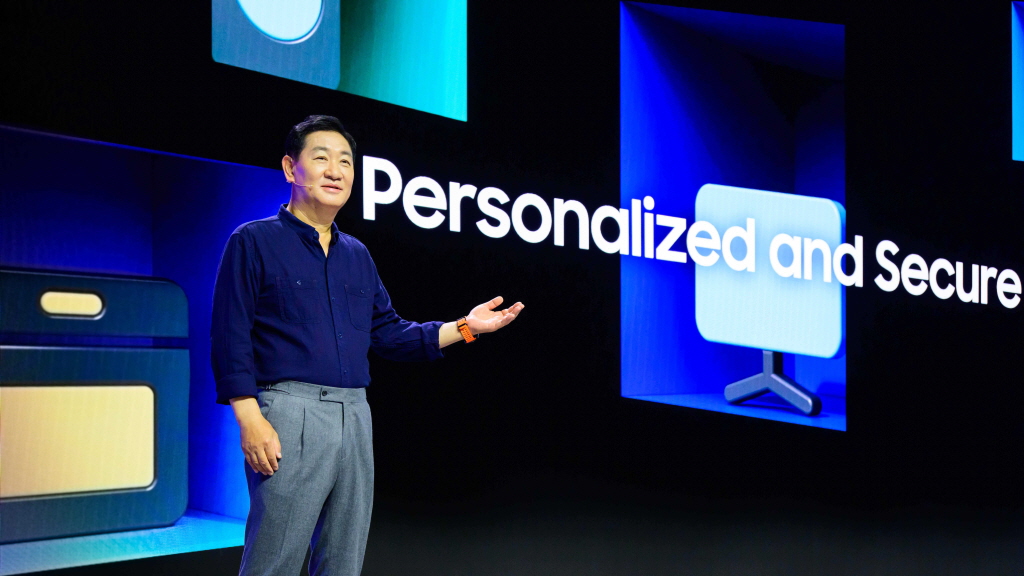삼성전자가 3일 미국 새너제이 맥에너리 컨벤션 센터(San Jose McEnery Convention Center)에서 삼성 개발자 콘퍼런스(Samsung Developer Conference, 이하 SDC) 2024를 개최하고, 모바일, 가전 등 향후 개발 방향을 전제품군에 AI를 적용해 온디바이스 AI와 고성능 클라우드 AI를 결합하고 최적화하고 생성형 AI를 강화해 안전하고, 개인화된 경험을 제공하는 방향으로 나갈 것이라고 제시했다.

▲‘삼성 개발자 콘퍼런스2024(Samsung Developer Conference 2024)’에서 삼성전자 DX부문장 한종희 대표이사 부회장이 기조 연설을 하고 있다.
삼성 개발자 콘퍼런스 2024, SW 전략·사용자 경험 개선
온디바이스 AI·고성능 클라우드 AI 결합, 생성형 AI 강화
삼성전자가 모바일, 가전 등 향후 개발 방향을 전제품군에 AI를 적용해 온디바이스 AI와 고성능 클라우드 AI를 결합하고 최적화하고 생성형 AI를 강화해 안전하고, 개인화된 경험을 제공하는 방향으로 나갈 것이라고 제시했다.
삼성전자는 3일 미국 새너제이 맥에너리 컨벤션 센터(San Jose McEnery Convention Center)에서 삼성 개발자 콘퍼런스(Samsung Developer Conference, 이하 SDC) 2024를 개최했다.
올해로 10주년을 맞이한 이번 행사는 모두를 위한 AI-10년의 개방적 혁신과 미래(AI for All-A Decade of Open Innovation and Beyond)를 주제로 진행됐으며, 전세계 개발자·파트너·미디어 등 약 3천명이 참석했다.
삼성전자는 멀티 디바이스 기반의 AI 기술로 보다 개인화되고 안전한 경험을 제공한다는 비전을 공유하고, 이를 실현하기 위한 최신 기술을 소개했다.
삼성전자 DX부문장 한종희 대표이사 부회장은 기조연설을 통해 “지난 10년 동안 개발자·파트너와 함께 노력했기에 혁신의 여정을 이어올 수 있었다”며 AI 시대에 경쟁력을 강화하고 동반 성장을 위한 개방적 협업을 강조했다.
또한 △AI 시대에 중요성이 더 커지고 있는 보안 △개인화 경험을 고도화하고 가족 구성원을 케어하는 최신 AI 기술 △AI 기술의 B2B 확대 의지 등을 밝혔다.
한 부회장은 “삼성전자는 향후 누가 말하는지, 어느 공간에 있는지까지 인지해 고도화된 개인화 경험이 가능하도록 준비할 것”이라며 “이 같은 서비스는 삼성전자의 AI 기반 SW·플랫폼 혁신과 보안 기술로 더 편리하고 안전하게 구현될 것”이라고 말했다.
예를 들어 △가족 구성원들의 음성만을 인식해 외부인이 기기를 제어할 수 없게 하고 △집안의 연결 기기와 센서가 집안 어디에 사용자가 있는지 감지해 평소 사용 패턴에 맞춰 온·습도를 조절해 주는 등 다양한 시나리오를 추진한다.
한 부회장은 TV·스마트 모니터·비스포크 AI 패밀리허브 냉장고 등에 내장된 스마트싱스 허브를 스크린이 탑재된 가전으로 확대하는 것을 검토하겠다고 밝혔다. 삼성전자 제품만 있으면 별도 허브 없이도 타사 기기까지 연결이 가능해지고, 여기에 엣지 AI(Edge AI) 기술을 더해 집안에 연결된 기기에 AI 기능을 강화한다는 계획이다.
이날 행사에는 한 부회장 외에도 삼성전자 임직원과 업계 관계자들이 다양한 전략과 비전을 소개했다. △삼성전자의 AI 연구 방향과 보안 기술 △주요 제품의 AI 기반 소프트웨어 경험 개선 △타이젠(Tizen) OS △스마트싱스(SmartTgings)플랫폼의 진화 등이 소개됐다.
이날 삼성전자는 모바일, TV, 가전에 이르기까지 각 제품의 특성에 맞는 AI 기술을 모든 제품군에 적용하고, 이 제품들을 연결해 더 개인화된 AI 경험을 구현한다는 계획을 공유했다.
삼성전자는 개인화된 AI 경험을 고도화하기 위해 보안에 강한 온디바이스(On-Device) AI와 고성능 클라우드 AI를 결합해 최적화하고, 생성형 AI의 지속적인 발전을 위해 개인정보보호와 보안 기술 연구에 집중하고 있다.
또한 삼성전자는 책임 있는 AI를 구현하기 위한 노력도 강조했다. 공정성, 투명성, 책임성의 3대 원칙하에 AI 기술이 활용되는 전 과정에서 임직원들이 AI 윤리 원칙을 준수할 수 있도록 체계적인 교육과 점검 프로세스를 실행하고 있다.
보안의 경우 2022년 처음 공개된 녹스 매트릭스(Knox Matrix)가 모바일 제품뿐만 아니라 TV, 가전 제품까지 확대돼 연결 기기간 보안 수준이 대폭 강화될 것이라고 설명했다.
삼성전자는 갤럭시 AI를 통해 고객들의 개인화 경험을 고도화하고 에코시스템 전반으로 AI를 확대할 예정이다.
이날 삼성전자는 AI 경험 확대를 위해 향후 구글 등 여러 업체와 개방적 협업을 더욱 강화할 것이라고 밝혔다. 또한, 연내 공개될 One UI 7은 갤럭시 AI 기능 확대와 더욱 정제되고, 인상적이며, 감성적인 UX로 완전히 새로워진 사용자 경험을 제공할 것이라고 소개했다.
비스포크 AI 가전은 △비스포크 AI 패밀리허브 냉장고의 AI 비전 인사이드(AI Vision Inside) △비스포크 AI 스팀 로봇청소기의 AI 바닥 인식 등을 소개하며, 제품별 최적화된 AI 기능이 고객의 일상을 변화시키고 있다고 강조했다.
향후에는 △7형 스크린과 스마트싱스 앱이 내장된 AI 홈 △진화된 AI 음성 비서 빅스비(Bixby) 등이 맞춤형 경험을 강화하고 접근성을 높일 것이라고 밝혔다.
AI TV 시대를 연 삼성전자는 TV의 역할에 대해서도 재정의했다. TV가 시청 위주의 경험을 넘어 사용자의 일상에 필요한 정보를 제공하고 있으며, 집안의 다른 기기와 연동해 맞춤형 서비스도 지원하고 있다고 설명했다.
모바일에서 AI로 생성한 결과를 TV로 직접 전송할 수 있는 삼성 AI 캐스트(Samsung AI Cast) 기능도 소개됐다. 사용자는 이 기능을 통해 AI로 만든 이미지를 대형 스크린에서 감상하거나, 보고 싶은 콘텐츠 목록을 홈 화면에서 바로 확인할 수 있다.
삼성전자는 B2B 영역에서 AI 기술의 중요성도 강조했다. △클라우드 기반의 차세대 사이니지 솔루션 플랫폼인 VXT(Visual Experience Transformation) △AI 기반 콘텐츠 제작과 운영· 관리를 위한 CMS(Content Management Solution) △ 시장 내 다양한 AI 파트너들의 솔루션을 경험해볼 수 있는 WiNE(Widget aNd Extension) △프레임워크를 활용한 파트너 특화 앱인 PIRS(Pre-Integrated Repeatable Solution) 등이 소개됐다.
삼성전자는 타이젠 OS가 TV, 비스포크 AI 패밀리허브를 포함해 비스포크 AI 콤보 세탁·건조기, 인덕션 레인지 등 7형 스크린이 부착된 가전까지 탑재되며 더 많은 기기에서 AI 기능을 구현하게 됐다고 강조했다.
또한 온디바이스 AI 기술을 강화해 보다 개인화된 서비스를 제공할 예정이라고 밝혔다. 특히, 삼성 NPU(Neural Processing Unit) 칩으로 구동되는 타이젠 AI 서비스는 삼성전자 제품과 사용자에 맞게 AI 모델을 최적화해 보다 스마트하고 안전한 사용을 지원한다고 강조했다. 현재는 TV에서 영상 통화를 이용할 때 음향 에코나 노이즈를 줄여 주고, 전자 칠판에서 사용자의 필기 스타일을 예측해 노트 솔루션을 개선해 주고 있다고 설명했다.
대폭 향상된 타이젠과 갤럭시 기기간 연동 기능도 소개됐다. 스마트폰·태블릿·노트 PC 사이에 지원되던 키보드·마우스 공유 기능 멀티 컨트롤은 스마트 모니터와 TV까지 지원이 확대돼 사용성을 높여준다.
한편 삼성전자는 개발자들을 위한 RISC-V 기반 타이젠 OS 구축을 완료하고, 관련 SDK를 2026년에 공개할 예정이다.
